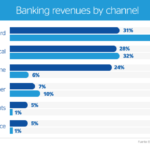Mobile banking and physical channels, the revenue niches in the financial system
In spite of the boom in the popularity of mobile banking, physical channels still account for 28% of the revenues in the financial system, and this figure is expected to hit 32% by 2020.

According to data provided to Business Intelligence by Efma and Backbase, the financial system hopes to be able to increase its revenues in the next five years thanks to mobile banking especially, but also by maintaining their physical channels, in detriment to online banking.
The number of users who access their accounts through their computer is set to fall sharply. According to the study, 24% of banks indicate that most of their revenue comes from users who log on via the computer, in what is known as online banking.
However, the respondents all signal that these data will decline drastically by 2020, as they predict that only 6% of users will access their bank via the Internet.

This study therefore outlines two strategies for the development of the financial ecosystem in the coming years, focused on mobile banking but without forgetting the physical channel:
Growth in online banking will be driven by mobile devices and not by computers as has been occurring until now. The mobile channel is becoming a key element for many users. According to this study, 91% of the millennial generation has a smartphone and 65% perform banking actions through their cellphone
The development of physical channels. Despite the increase in the use of mobile banking, it is important to continue developing these channels to meet the needs of their customers. In fact, 44% of millennials do not intend to give up using cash, and the proposed strategy therefore combines physical channels with mobile banking.
These type of hybrid products include ATMs that will operate without credit cards, such as the ones proposed by Bank of America, among others.